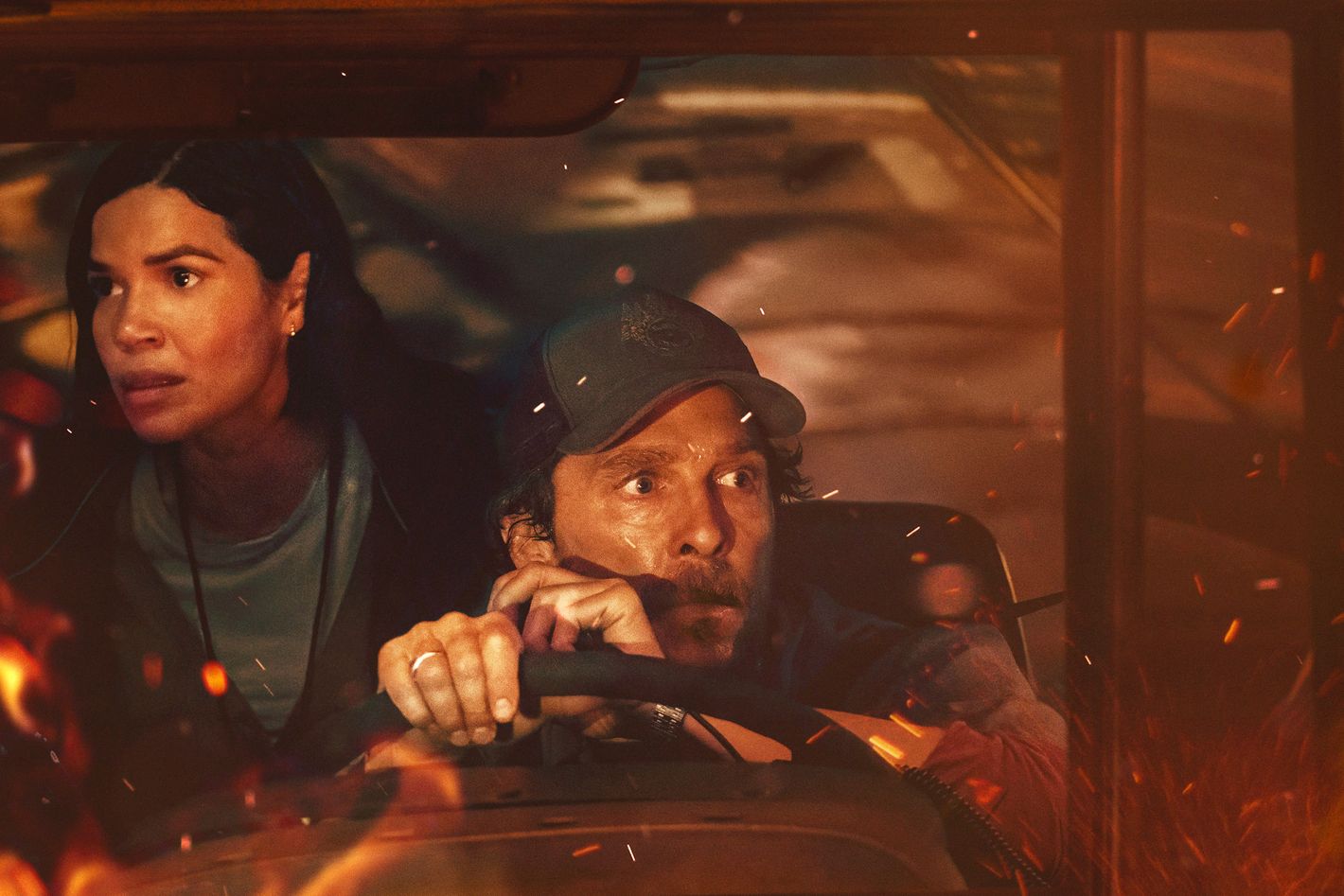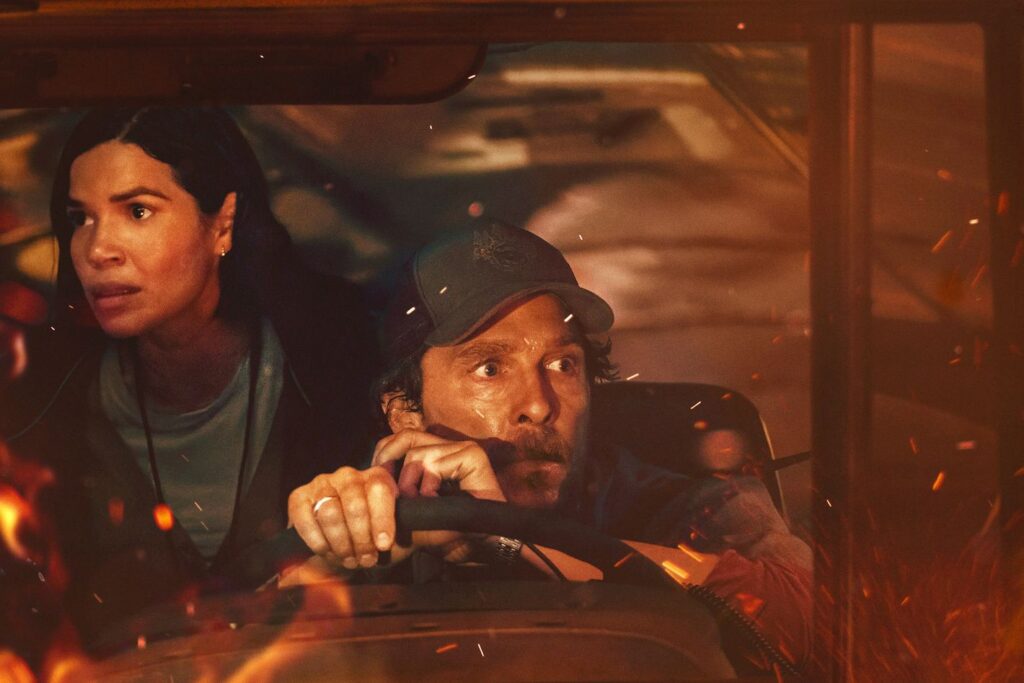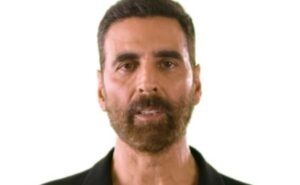
The agitated, ominous vibration of giant power lines and quaking transmission towers feels like a Greek chorus throughout Paul Greengrass’s intense new wildfire thriller, The Lost Bus. Over the course of the film, Greengrass regularly cuts away to the churning cables and metal structures, as well as to the roaring flames of the 2018 Camp Fire, as the blaze makes its way across the mountains and cliffs of Northern California. This helps us follow the spread of this real-life disaster, and it also conveys the puniness and impotence of the mortals fighting it. Based on real-life stories from the Camp Fire (still the deadliest wildfire in California history), The Lost Bus, which just premiered at the Toronto Film Festival ahead of a short September theatrical release and an October 3 debut on Apple TV+, offers plenty of suspense and heroism. But it’s all tempered by the knowledge that these fires are inescapable, growing, and unstoppable.
At heart, The Lost Bus is a disaster movie — a great one — and it has some of the classic moves of a disaster movie, complete with the slightly on-the-nose narrative shorthand designed to introduce characters quickly and efficiently. Greengrass cuts across a number of arenas and people, including the various fire crews trying to deal with this rapidly deteriorating situation, but the central narrative belongs to Kevin McKay (Matthew McConaughey), a down-on-his luck school-bus driver in Paradise, California, who returned here after his life fell apart elsewhere. Kevin is already having one of the worst days of his life even before everything burns down: His dog is dying, his teenage son is home sick from school (and also hates him), his mom is elderly and out of it, and his ex-wife is berating him on the phone. He’s also missed his bus’s inspection appointments, he’s running out of money, and his supervisor thinks he’s a flake. Once the flames come roaring into town, however, Kevin will be the only one in a position to drive a busload of elementary-schoolers, along with their teacher, Mary Ludwig (America Ferrera), through the downright biblical flames and out to safety. It’s Speed meets the end of the world.
McConaughey was made for parts like this: the good old boy facing extraordinary circumstances. He knows exactly how to sell this character and his desperation — not with confidence, but with a “damn the torpedoes, I’ll try anything once” bravado. Honestly, they should cast him in every disaster movie. Plus, he makes a fine match with Ferrera, whose teacher must exude outward calm for the benefit of her kids while she’s not-so-secretly freaking out inside. (Both Kevin and Mary have their own kids elsewhere that they’re also worried sick about.) As everything falls apart around them in ways both big and small, we enjoy watching these two opposites butt heads and quibble and then learn to function as a team.
The film feels like a homecoming for Greengrass, who cut his teeth in the world of you-are-there television documentaries before helping redefine the modern action movie with the handheld urgency of hits like The Bourne Supremacy and The Bourne Ultimatum. The director also carried that approach over to docudramas like United 93, Captain Phillips, and July 22 (as well as his earlier, masterful Bloody Sunday, the movie that put him on the map back in 2002). But the “shaky cam” style ran its course some years ago; his last effort was the stately and old-fashioned Tom Hanks western News of the World, a beautiful picture whose release got swallowed up by the COVID-19 pandemic.
In The Lost Bus, Greengrass combines his thriller side with his reportorial side. He films Kevin and Mary and the schoolkids’ journey through hellfire as a no-holds-barred action spectacle full of immediacy and awe, complete with hair’s-breadth escapes and incredible visions of destruction. (It’s frankly a shame that The Lost Bus isn’t getting a wider theatrical release; it was clearly made to be a big-screen experience.) Some incidents have been a bit sensationalized, but Kevin and Mary’s heroism was very real, as evidenced in Lizzie Johnson’s exhaustively researched and absorbing 2021 nonfiction book Paradise: One Town’s Struggle to Survive an American Wildfire, on which the film is loosely based. To that end, the film also offers a more diffuse and heavily researched portrait of what goes into battling a wildfire, and Greengrass’s vérité style lends authenticity to the scenes of fire chiefs strategizing, of ground crews and air crews trying to combat the blazes and save lives. The picture thus combines the excitement of an old-school disaster spectacle with a fly-on-the-wall portrait of institutions struggling to function in the face of a calamity. The effect is singular: We enjoy the thrill ride immensely, but it’s the realism that sticks with us. Movies end, but the fires are here to stay.
More From the 2025 Toronto International Film Festival
It’s Speed meets the end of the world.

































































